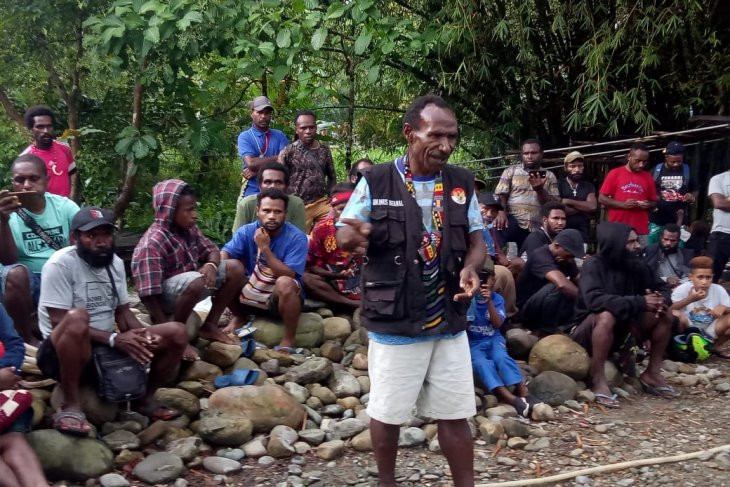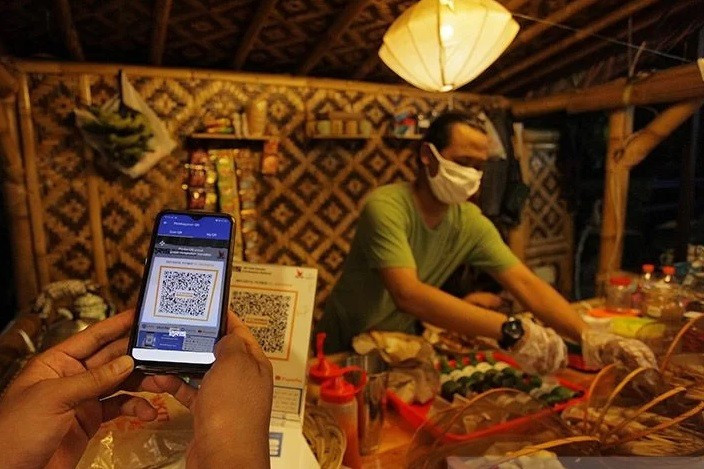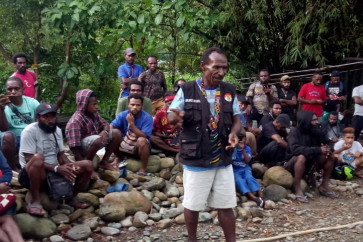Popular Reads
Top Results
Can't find what you're looking for?
View all search resultsPopular Reads
Top Results
Can't find what you're looking for?
View all search resultsA final call to tackle the Papua refugee crisis in new regions
As of 2021, around 60,000 people have been displaced by the ongoing conflict in Papua, causing a regional humanitarian emergency.
Change text size
Gift Premium Articles
to Anyone
 Safe haven: Community figure Kolinus Beanal (center) and people of Banti hamlet in Tembagapura district in Papua gather near their shelter in Timika on Oct. 29, 2020. About 1,800 residents of Banti, Kimbeli and Opitawak hamlets sought refuge in Timika in March 2020 to evade armed conflict between security forces and rebel groups. (Antara/Evarianus Supar)
Safe haven: Community figure Kolinus Beanal (center) and people of Banti hamlet in Tembagapura district in Papua gather near their shelter in Timika on Oct. 29, 2020. About 1,800 residents of Banti, Kimbeli and Opitawak hamlets sought refuge in Timika in March 2020 to evade armed conflict between security forces and rebel groups. (Antara/Evarianus Supar)
D
espite President Joko “Jokowi” Widodo enacting the law on the formation of three new provinces in Papua late in July, public debate and dissatisfaction with the Jakarta policy remain unabated.
From the beginning, the Papuan People’s Council (MRP) and civil society groups have rejected and condemned the regional division plan. They say the measure will not solve the existing complexities in Papua.
One profound concern for most Papuans is the perception that new autonomous regions (DOB) will only accelerate business expansion, resulting in the greater control of resources by corporations without guaranteeing justice for the indigenous people.
This corporate action typically involves land grabbing and a weakening of the indigenous people’s bargaining position. As a result, the problem remains that indigenous people are becoming more marginalized in regard to the land, territory and resources to which they traditionally belong. To make matters worse, expanding external investment under the DOB will contribute to mass deployment of the Indonesian Military (TNI) that could intensify human rights violations in Papua.
On top of that, maintaining security and order has become an alarming issue in Papua. Armed conflicts between the TNI and police forces and the Papua National Liberation Army (TPNPB), which the government refers to as an armed criminal group (KKB) and terrorist groups, have recently escalated. Most recently the TPNPB claimed responsibility for the killing of at least 10 civilians, including a pastor, in Nduga regency, and the beheading of another civilian in Yahukimo regency last month.
These conflicts have steadily caused an influx of internally displaced persons (IDP) in Papua. IDPs in Papua are considered a neglected and prolonged issue without practical solutions.
As of 2021, around 60,000 people have been displaced by the ongoing conflict, causing a regional humanitarian emergency. The most affected IDPs who reside in Maybrat, Nduga, Intan Jaya and Puncak Jaya highlands are now facing lingering dangers as the conflict shows no sign of abating.


















